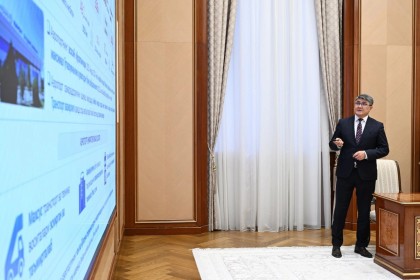The Senate passed the Entrepreneurial Code at its today’s session, the press service of the upper house of parliament said. Today, there are about 5,000 documents regulating entrepreneurial activity in Uzbekistan. Due to the uncoordinated adoption of such a large number of documents, entrepreneurs face difficulties in finding requirements applicable to their business.
Chairman of the Committee on Budget and Economic Reforms, Erkin Gadoev said that more than 100 legal documents, including 9 laws, are being unified into the Entrepreneurial Code to this end.
Classification of business
In 2022, the president announced a new classification of business, according to which separate tax regimes were introduced for firms with different turnover. The previous draft of the Code included a division into these categories.
At that time, it was envisaged to divide businesses by the size of their annual turnover:
- microbusiness - up to 3,500 BSU;
- small business - up to 35 thousand BSU;
- medium business — up to 350 thousand BSU;
- large business — over 350 thousand BSU.
In February last year, the president signed a decree on a new classification of business, which is divided into small (individual entrepreneurs, microfirms, small enterprises), medium and large businesses.
Erkin Gadoev added that the new Code had introduced three categories of businesses: small, medium and large, depending on the number of employees and annual turnover (it is enough for a business to meet one of the criteria: the number of employees or turnover).
Individual entrepreneurs
Currently , individual entrepreneurs can only be engaged in a certain list of activities, including 88 categories (for example, real estate activities, cargo transportation, tutoring, handicrafts, etc.).
The Code has outlined the types of activities that individual entrepreneurs cannot be engaged in. For individual entrepreneurs, the right to conduct any activity not prohibited by law is introduced.
State regulation
To reduce state interference in business activities, the appendix to the Code has approves a list of 147 oversight functions of 38 state bodies (there were 39 in the draft) and 20 types of inspections that can be carried out after notifying the business ombudsman.
All checks not included in the list are carried out after being allowed by the business ombudsman.
4 forms of state control have been identified: analysis of statistical and other data, monitoring, preventive measures and inspection.
Financial sanctions against businesses are applied by the court (with the exception of sanctions in the field of taxation and banking).
In cases where a financial sanction is imposed on an entrepreneur for the same offense and administrative liability is imposed on his official, only the financial sanction will be applied.
Financial sanctions will not be applied to businesses who have committed a violation for the first time, if they comply with the procedure to eliminate the violation, as well as compensate for the damage caused.
The Code also provides for the creation and publication of a register of mandatory requirements in the field of entrepreneurship, including all requirements, and a single register of benefits for business. At the same time, it is prohibited to impose liability for requirements not included in the register of mandatory requirements. If government agencies make demands not included in the register, they will be punished by law.
It is established that documents providing for the imposition of additional obligations on entrepreneurs will enter into force after a year (with the exception of mitigating rules).
Subsidies
Subsidies will be provided by decrees of the President of Uzbekistan, and the procedure for issuing them is determined by the government.
In addition, the main areas of subsidies have been outlined, and they shall be distributed through the Unified Interactive Portal of Public Services on the One Stop principle
State enterprises are prohibited from providing direct tax, customs and other types of benefits and preferences that restrict competition.
Social entrepreneurship
The Code includes the concept of social entrepreneurship, social enterprise, a list of socially needy groups of the population and mechanisms for their support, including persons with disabilities.
Deputy Minister of Justice of Uzbekistan Alisher Karimov reported that this category also plans to include types of business aimed at solving environmental problems (including recycling, collection, disinfection, burial, storage of household waste, etc.). The senator proposed to include in this list the construction of treatment facilities and the installation of filters.
Women's and youth entrepreneurship
An enterprise will be included in the category of women's entrepreneurship if the only financially responsible person is a woman or the number of women in the management is at least 1/3 or the share of women in the authorized capital is more than 50%.
Similar criteria apply to youth entrepreneurship.
Today, about 42 thousand small and medium-sized businesses are owned by women, and out of 243 thousand individual entrepreneurs, more than 140 thousand or 42% are women, said Senator Malika Kodirkhonova.
In addition, criteria are being determined for assigning the status of "inactive enterprise" to a business.
The chairperson of the Senate, Tanzila Narbaeva said that major preparations were currently underway for the traditional open dialogue between the head of state and business leaders. "We believe that the adoption of this Code will serve to effectively resolve systemic issues that interest our entrepreneurs," she said.
The Entrepreneurship Code has been under development since 2021. The current draft is the third version of the document, the previous versions of which were presented in May and September 2022.
This way, businesses will be able to obtain all the necessary information and requirements for doing business in one place.















